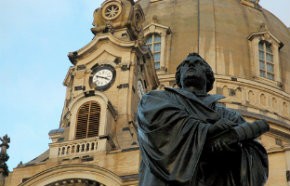Luther’s legacy
Lutheran theologian Carl Braaten once lamented that while Roman Catholics do not understand why the Reformation was necessary, Protestants do not understand why it was tragic.
It’s taken me many years to appreciate the tragic consequences of the Reformation—that it led to disunity as well as to needed reform. Perhaps I understand this better these days because the unity of my own Presbyterian family has become fragile, with some congregations resigning from the denomination and starting a new one.
It’s impossible to read the New Testament and not conclude that some kind of unity is at the heart of the matter: unity between strangers and adversaries, races, genders and even religions. At one point St. Paul suggests that the unity of the whole creation has been God’s agenda from the beginning. So on at least one level the Reformation is a tragedy.
Read our latest issue or browse back issues.
On the other hand, however, the facts of history underscore the necessity of the Reformation. Corruption and the appalling abuse of power inspired courageous Christians, who often paid for their dissent with their lives, to imagine a new and more faithful way of being the church of Jesus Christ. This effort began well before 1517, when Martin Luther posted his 95 theses.
On Reformation Sunday, Protestants used to bash the pope and thank God they were not Catholic. Catholics viewed Protestants with suspicion and fear and were assured that theirs was the only true church. Sadly, that issue has not been resolved. I am still not welcome at the Lord’s table in a Catholic church.
Fortunately, ecumenical work proceeds between Catholic and Protestant congregations and individuals in spite of the ravings of the Protestant evangelical right and the refusal of the Catholic hierarchy to acknowledge Protestant churches as churches.
In the Sunday Review section of the August 12 New York Times, historian Steven Ozment proposes that Martin Luther’s thinking continues to influence German society. Ozment will no doubt be taken to task for making too much of Lutheran influence in one of Europe’s most secular societies, but I believe, as he does, that the Protestant Reformation and the churches of the Reformation have had a profound impact on Western civilization.
Ozment suggests that the German insistence on austerity as a response to Europe’s current fiscal crisis is pure Lutheran. He also reminds us that Luther saw compassion and the care of the poor as a community responsibility. The community chest, an early name for what became the United Way in the U.S., was Luther’s invention. Every German town was to have a fund that would aid needy citizens who pledged to repay when they returned to solvency and self-sufficiency. Ozment points out that Chancellor Angela Merkel is the baptized daughter of an East German Lutheran pastor, and that German president Joachim Gauck is a former Lutheran pastor.
The Reformation led to a full embrace of the radical political implications of a humanity created in the image of God—each individual with God-given dignity and value. And as a consequence it led to political rights, to a new recognition of justice in the civic and political arena, and to a stress on grace as the fundamental word that God has spoken and on gratitude as the essential response of one who has received grace.
It is a good thing to remember these things on Reformation Sunday and to express gratitude for this good and important heritage as we sing, “A Mighty Fortress is our God, a bulwark never failing.” I was delighted to learn from a friend, the pastor of the Catholic church in our neighborhood, that his congregation will be singing it too on Reformation Sunday.
The New York Times citation in the seventh paragraph was corrected on October 17, 2012.








